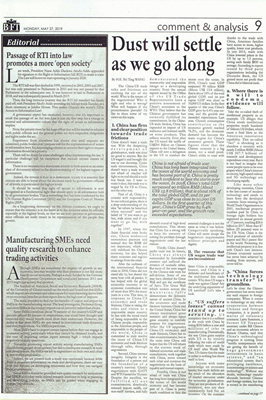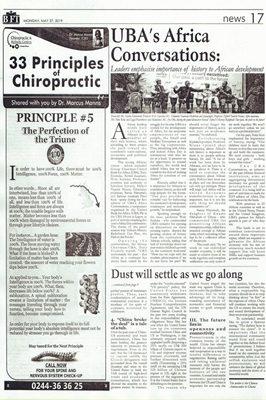On 27 May 2019, the Business & Financial Times published a signed article by Chinese Ambassador to Ghana H.E. Shi Ting Wang entitled Dust Will Settle As We Go Along. The article introduced China’s position towards China-US trade frictions, disproved the reasons that the US wage the trade war, and emphasized that a responsible big country should not think about “us first” at the expense of others. The full text is as follows:


The China-US trade talks and frictions are catching the eye of the world. What is the nature of the negotiations? Who is right and who is wrong? What will happen if the protectionism prevails? I’d like to share some of my views on this topic.
I. China has firm and clear position towards trade frictions
China doesn't want a trade war. With the deepening development of globalization, trade war does no good to anyone. But the US waged it and brought the war to our doorstep. Under such circumstances, China doesn't want a trade war, is not afraid of one,but will fight to its end should a trade war break out. I want to make it clear, this trade war is waged by the US to China, not the other way.
First of all, China is a country with responsibility. In our cultural genes, there is a deep understanding of the idea “let others be benefited when succeed” and the belief of “if you want to go fast, walk alone; and if you want to go far, walk together”. In 1997, when the Asian financial crisis broke out, China withstood tremendous pressure and insisted that the RMB did not depreciate, which not only stabilized the Chinese economy, but also helped many countries and regions to emerge from the crisis. After the outbreak of the international financial crisis in 2008, China did not stand idly by, but shared the same boat with all parties. It has helped with the global economic recovery at an economic contribution rate of more than 30% for many years in a row. This time, in response to China-US economic and trade frictions, China is taking the roles and vision as a responsible major country. In line with the moral stand of being responsible to the Chinese people, responsible to the American people, and responsible to the people of the world, China is committed to truly resolve the issue of China-US economic and trade frictions through talks, through negotiations.
Second, China stresses integrity. Integrity is the foundation of a person and the foundation of a country's survival. China’s negotiations with GATT and WTO lasted for 15 years. Despite the sacrifice, we fulfilled all our commitments, drastically reduced import tariffs, cut non-tariff barriers, and fully demonstrated the trustworthy and responsible image as a developing country. Even the annual reports issued by the Office of the US Trade Representative have a positive assessment of China's accession to the WTO. They believe that the Chinese government has earnestly fulfilled its commitments. In the China-US trade friction, China has expanded its import of US soybeans and lowered tariffs on some products. This reflects sincerity. Even after the US raised the tariffs of US$200 Billion on Chinese exports to the United States, China still sent a delegation to the US to conduct the eleventh round of high-level consultations. This shows that China has a strong will to keep the sincerity of solving the problem through negotiations until the last minute.
Thirdly, China doesn’t prefer trade war. In history, China was always surrounded by formidable enemies and suffered the invasion of nomadic tribes. But most of the wars waged by the Chinese side were for self-defense. Some of you may have climbed the Great Wall and got the certificate of hero. The Great Wall which snakes across the mountains fully demonstrates the defensive nature of ancient China. In the economic and trade frictions between China and the United States, China has always maintained great restraint and always taken great sincerity to carefully prepare for negotiations. After the US upgrades China-US economic and trade frictions, China has to take countermeasures, but at the same time China still hopes that the US will return to the correct track of bilateral economic and trade consultations, work together with China, move toward each other and continue the negotiations on the basis of equality and mutual respect.
Fourthly, China is not afraid of trade war. China has long been integrated into the ocean of the world economy and has become part of it. China is pretty much confident to face the storm over the ocean. In 2018, China’s total GDP surpassed 90 trillion RMB (About US$ 13.8 trillion), that is about 16% of the total global GDP, and its per capita GDP was close to 10,000 US dollars. In the first quarter of this year, China's GDP grew by 6.4% year-on-year, and the growth rate exceeded expectations. Last year, Chinese consumption contribution to the economic growth reached 76.2%, and the domestic demand has become the main engine for China’s economic growth. These figures show that the Chinese economy is a big ocean, not a small pond. China's ability to cope with external challenges is not the same as what it was before. Categorically speaking, China will never accept the hegemonic requirements without principle and dignity.
II. The reasons that US wages trade war are inconsistent
Since China is responsible, honest, and China is a defender and beneficiary of the multilateral free trade system. Why does US wage a trade war against China? Are the underlying arguments of US justified? Let’s take a look.
1. “US suffers losses” cannot stand up to scrutiny. US complains that it is a sufferer in the trade with China by losing $500 billion a year and millions of jobs in manufacturing. Dramatically, the way China gains surplus with US is by strictly following the rules of world trade which were made by US itself after World War Two. US claims that the trade is unfair is nothing but shoot itself in foot.
Anyone with some knowledge on economy knows that trade deficits are the result of the allocation of market resources under the economic globalization. They are not products of ill-intention, nor are they necessarily bad for an economy. On the contrary, thanks to the trade with China, American families have access to more, higher quality, lower cost products. In just 2015, trade with China lowered prices in the US by up to 1.5 percent, saving each family $850 on average. According to report issued by third party organizations including the Deutsche Bank, the US gained more net profit than China did in bilateral trade.
2. Where there is a will to condemn, evidence will follow. Take the so-called theft of intellectual property as an example. US alleges that China steals intellectual properties worth hundreds of billions US Dollars, which cause a fatal blow to the American innovation capability. This so-called “fact” is shocking as it slanders a country with nearly 2 trillion RMB (About US$ 307.7 billion) of research and development expenditure every year. But it is not hard to imagine that some people turns to be sour grapes when China’s internet economy, high-speed railway and 5G technology are developing rapidly.
Like many other developing countries, China is the late-comer of modern technology and needs to learn from the developed countries. Since entering the World Trade Organization in 2001, intellectual property royalties paid by China to foreign right holders has registered an annual growth of 17 percent, reaching $28.6 billion in 2017. More than $7 billion (25 percent) went to the US. Now, China is the No.2 producer of scientific papers and No.1 patent filer in the world. Protecting the intellectual property is in line with China’s own interests. Chinese economic success has never been achieved by stealing from anyone, and never will be.
3. “China forces technology transfer” is groundless.
Let's be clear: the Chinese government has never made any such request to foreign companies. When it comes to technology or any other cooperation between Chinese and foreign companies, it is purely a matter of voluntary contracts. Larry Summers, a former US Treasury secretary under Bill Clinton and an economic advisor to Barack Obama, said that China's technological progress is coming from “terrific entrepreneurs who are getting the benefit of huge government investments in basic science,” and “an educational system that's privileging excellence, concentrating on science and technology”. Without any doubt, technology transfer abounds between Chinese and foreign entities, but that is rooted in the transferring parties' pursuit of maximum profits. Thus, such condemnation of normal commercial practices is a mockery of the spirit of contract, motivated by selfishness.
4. “China broke the deal” is a tale of a tub.
Over the past year of China-US economic and trade consultations, China has been holding the greatest sincerity to promote the negotiations. Even in the case that the US threatened to impose tariffs, the Chinese delegation still proceeded from the overall situation and went to the United States to hold the 11th round of high-level trade and economic consultation, which has showed the sincerity to the greatest extent. In contrast, under the "results-oriented" "US priority" policy, the United States has successively withdrawn from the Paris Agreement, UNESCO, the Iranian Nuclear Comprehensive Agreement, and the UN Human Rights Council in the past two years, evading its due responsibilities and obligations. Since May last year when the United States tore up the consensus reached between China and US in Washington, it has arbitrarily imposed tariffs, upgraded tariffs (Imposing a 25% tariffs on US$ 200 billion of Chinese export to US) and imposed extreme pressure afterwards, and further threatened with tariffs (Threatening a 25% tariff on the remaining US$ 325 billion of Chinese export to US) right in the process of the negotiation. It is the United States that is defaulting on the promise.
The reason why United States waged the trade war against China is not to solve the problem of fairness, but to take advantage of its long-standing ascendancy of economic and financial norms to grab unequal benefits.
III. The future lies in openness and connectivity
Protectionism is the common enemy of the world. China has always believed in responsibility and cooperation as a way to resolve differences in negotiations. Raising tariffs and taking unilateral measures only harms the interests of the people and business of the two counties. A sound and stable economic partnership between the US and China is important for not only the two countries, but also the world economy. Therefore, what a responsible big country should do is to stop thinking about “us first” at the expense of others. China will continue working with the US to ensure the steady and sound development of their economic partnership.
To conclude, I would like to quote a famous saying, “The darkest hour is nearest the dawn”. It is important that the international community stand firm and stand together at this darkest hour of protectionism. I believe that if we work together based on the openness and connectivity, rather than the selfish exclusion and protectionism, we will embrace the dawn of global economy and the dawn of a beautiful world.